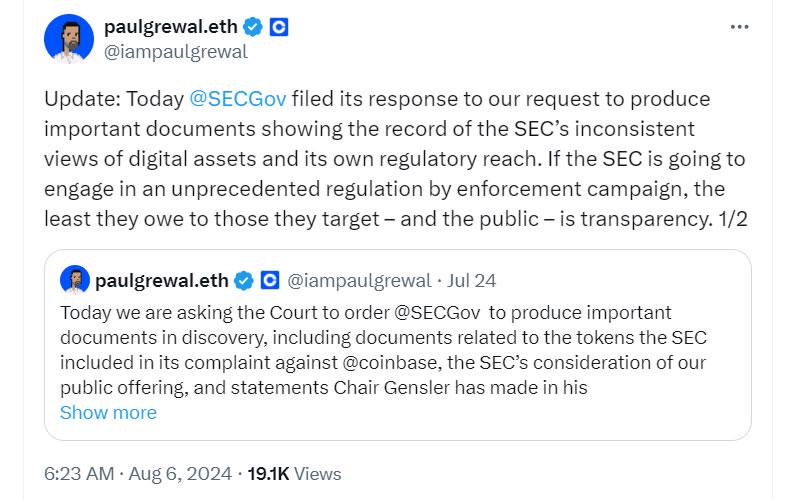Stuart Alderoty, the Chief Legal Officer of Ripple Labs, has expressed his support for United States Securities Exchange Commission (SEC) Commissioner Hester Peirce’s stance against perceived injustices in the LBRY lawsuit. In a recent statement, Alderoty thanked Commissioner Peirce and suggested the possibility of submitting an amicus brief to address ongoing injustices in non-fraud cases. This article explores the context of the LBRY lawsuit, Commissioner Peirce’s dissent, and the support it has garn ered from the cryptocurrency community.
On October 27, SEC Commissioner Hester Peirce issued a dissenting statement regarding the LBRY lawsuit, expressing her concerns about the ongoing litigation. Commissioner Peirce highlighted that the SEC had recently initiated several enforcement actions against cryptocurrency exchanges, including Ripple, LBRY, Kraken, Binance, and Coinbase. However, it was the LBRY lawsuit that particularly disconcerted her.
LBRY lawsuit background
In July, the SEC determined that LBRY, a platform known for its blockchain-based file-sharing and payment network, had violated Section 5 of the Securities Act of 1933. Consequently, LBRY was permanently barred from engaging in any unregistered cryptocurrency securities offerings involving its native token, thus facing significant regulatory restrictions.
LBRY initially sought to appeal the judgment by the SEC but later abandoned its efforts, citing perceived futility. Throughout the legal process, the XRP community rallied in support of LBRY, including during the appeal. Nevertheless, with the litigation concluding in the SEC’s favor, LBRY made the difficult decision to shut down, citing financial burdens and regulatory pressure as the primary reasons for its closure.
Stuart Alderoty, representing Ripple Labs and the XRP community, expressed gratitude towards Commissioner Peirce for her dissenting statement. He acknowledged the importance of raising concerns more vocally and promptly, especially when consumers are still awaiting resolution for fraud cases. Alderoty even suggested the possibility of submitting an amicus brief to address the perceived injustices in non-fraud cases.
John E. Deaton, a pro-XRP lawyer who has been critical of the SEC’s actions against Ripple, also weighed in on Commissioner Peirce’s statement. Deaton believes that, just as 75 thousand individual holders expressed their views in court during Ripple’s legal battle, it is crucial for someone with insider knowledge to speak out in a court of law. This sentiment aligns with Commissioner Peirce’s perspective, as she clearly articulated in her dissenting statement.
Cryptocurrency community’s support
The LBRY lawsuit and Commissioner Peirce’s dissent have garnered significant attention and support from the cryptocurrency community, particularly the XRP community. Members of the community have been actively engaged on social media platforms, expressing their solidarity with LBRY and their appreciation for Commissioner Peirce’s willingness to voice concerns.
An amicus brief, which Alderoty suggested as a potential course of action, is a legal document filed by individuals or organizations who are not directly involved in a case but have an interest in its outcome. Such a brief can provide additional perspective and information to the court, helping to shape the legal decision-making process.
Stuart Alderoty, the Chief Legal Officer of Ripple Labs, and members of the XRP community have expressed their support for SEC Commissioner Hester Peirce’s dissent in the LBRY lawsuit. The LBRY case, which has raised concerns within the cryptocurrency community, saw LBRY facing regulatory restrictions after violating securities regulations.
Alderoty’s suggestion of submitting an amicus brief reflects a growing desire to address perceived injustices in the cryptocurrency space, and it remains to be seen how this development may impact the ongoing legal landscape for digital assets. As the cryptocurrency industry continues to evolve, legal and regulatory challenges are likely to remain at the forefront of discussions, with voices from both within and outside the industry advocating for clarity and fairness in enforcement actions.





